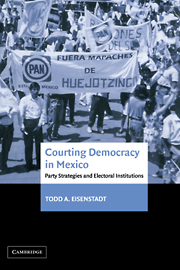Book contents
- Frontmatter
- Contents
- Figures and Tables
- Acknowledgments
- Courting Democracy in Mexico
- 1 Electoral Courts and Actor Compliance: Opposition-Authoritarian Relations and Protracted Transitions
- 2 Ties That Bind and Even Constrict: Why Authoritarians Tolerate Electoral Reforms
- 3 Mexico's National Electoral Justice Success: From Oxymoron to Legal Norm in Just over a Decade
- 4 Mexico's Local Electoral Justice Failures: Gubernatorial (S)Election Beyond the Shadows of the Law
- 5 The Gap Between Law and Practice: Institutional Failure and Opposition Success in Postelectoral Conflicts, 1989–2000
- 6 The National Action Party: Dilemmas of Rightist Oppositions Defined by Authoritarian Collusion
- 7 The Party of the Democratic Revolution: From Postelectoral Movements to Electoral Competitors
- 8 Dedazo from the Center to Finger Pointing from the Periphery: PRI Hard-Liners Challenge Mexico's Electoral Institutions
- 9 A Quarter Century of “Mexicanization”: Lessons from a Protracted Transition
- Appendix A Coding the Postelectoral Conflict Dependent Variable
- Appendix B Coding of Independent Variables
- Bibliography
- Index
2 - Ties That Bind and Even Constrict: Why Authoritarians Tolerate Electoral Reforms
Published online by Cambridge University Press: 22 September 2009
- Frontmatter
- Contents
- Figures and Tables
- Acknowledgments
- Courting Democracy in Mexico
- 1 Electoral Courts and Actor Compliance: Opposition-Authoritarian Relations and Protracted Transitions
- 2 Ties That Bind and Even Constrict: Why Authoritarians Tolerate Electoral Reforms
- 3 Mexico's National Electoral Justice Success: From Oxymoron to Legal Norm in Just over a Decade
- 4 Mexico's Local Electoral Justice Failures: Gubernatorial (S)Election Beyond the Shadows of the Law
- 5 The Gap Between Law and Practice: Institutional Failure and Opposition Success in Postelectoral Conflicts, 1989–2000
- 6 The National Action Party: Dilemmas of Rightist Oppositions Defined by Authoritarian Collusion
- 7 The Party of the Democratic Revolution: From Postelectoral Movements to Electoral Competitors
- 8 Dedazo from the Center to Finger Pointing from the Periphery: PRI Hard-Liners Challenge Mexico's Electoral Institutions
- 9 A Quarter Century of “Mexicanization”: Lessons from a Protracted Transition
- Appendix A Coding the Postelectoral Conflict Dependent Variable
- Appendix B Coding of Independent Variables
- Bibliography
- Index
Summary
… but you must bind me hard and fast, so that I cannot stir from the spot where you will stand me … and if I beg you to release me, you must tighten and add to my bonds.
Ulysses on how to restrain his reaction to the sirens' song in The OdysseyThe underdog National Action Party (PAN) unseated Mexico's long-reigning authoritarian incumbents in the 2000 presidential election, but only after preparing decades for the race. The electoral demise of the Party of the Institutional Revolution (PRI) after seventy-one years, ending the longest period of one-party rule in the world, was actually the culmination of a protracted transition to democracy spanning at least twenty-three years. Especially over the last decade, the PAN pushed the authoritarian incumbents to make Mexican elections credible, begging the question of why authoritarians would permit electoral reforms that reduced their capacity for rigging elections, introduced genuine uncertainty into electoral contests, and ultimately, led to the PAN's presidential victory in July 2000.
Clearly, authoritarian incumbents have little interest in political liberalization and undertake such policies only when they perceive that they have little other choice to channel social movement opposition into political parties (such as the Brazilian military dictatorship's consciously taken “decompression” starting in the mid-1970s), gather information about regime and opposition support under rapidly changing circumstances (such as the Polish elections of 1990), mollify international critics (such as the People's Republic of China in the 1990s), or use the electoral arena as a means to manipulate the opposition (as in Mexico and Taiwan in the early 1990s and South Korea in the early 1980s).
- Type
- Chapter
- Information
- Courting Democracy in MexicoParty Strategies and Electoral Institutions, pp. 32 - 59Publisher: Cambridge University PressPrint publication year: 2003



